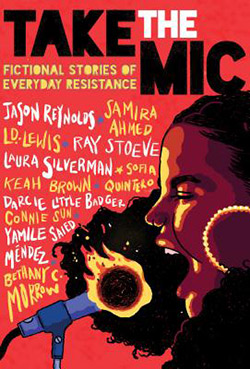Reviewed by Debbie Reese
Review Source: American Indians in Children’s Literature
Book Author: Bethany C. Morrow
Dr. Darcie Little Badger has two stories in Take the Mic: Fictional Stories of Everyday Resistance. In the final pages of the book you can read a little about her. I follow her on Twitter (@ShiningComic) and it has been terrific reading her tweets as she’s made her way to that PhD in Oceanography from Texas A&M.
Edited by Bethany Morrow, Take the Mic: Fictional Stories of Everyday Resistance came out in 2019 from Scholastic. Here’s the description:
You might be the kind of person who stands up to online trolls.Or who marches to protest injustice.
Perhaps you are #DisabledAndCute and dancing around your living room, alive and proud.
Or perhaps you are the trans mentor that you wish you had when you were younger.
Maybe you call out false allies, or stand up to loved ones.
Maybe you speak your truth and drop the mic, or maybe you take it with you when you leave.
This anthology features fictional stories — in poems, prose, and art — that reflect a slice of the varied and limitless ways that readers like you resist every day. Take the Mic‘s powerful collection of stories features work by literary luminaries and emerging talent alike, including Newbery-winner Jason Reynolds, New York Times bestseller Samira Ahmed, anthologist and contributor Bethany C. Morrow, Darcie Little Badger, Keah Brown, Laura Silverman, L.D. Lewis, Sofia Quintero, Ray Stoeve, Yamile Mendez, and Connie Sun, with cover and interior art by Richie Pope.
The first and last story in the book are Darcie’s. The first one is “Grace” and the last is “Homecoming.” In her introduction, Bethany wrote that the resistance in “Grace” is an Indigenous girl who doesn’t stand for unwanted physical advances. That does happen in the story and I love how it is done. As an Indigenous person, I see several other acts of resistance in Darcie’s stories.
“I’m Lipan Apache” is one. With those three words in the story, Grace is pushing back on the notion that Native peoples are monolithic. Another misguided notion is that Native peoples live on reservations. In fact, some of us do and some of us don’t. Some are on our reservations sometime, but not all the time. And some of our nations don’t have reservations. Some of us have ancestral land that isn’t reservation land, that we return to periodically. That theme in “Grace” is embodied by her account of where she’s lived, where she’s living when the story takes place, and where she’s going to live. Continue reading.

Take the Mic: Fictional Stories of Everyday Resistance by Bethany C. Morrow
Published by Scholastic Inc. on October 1, 2019
Genres: Activism
Pages: 272
Reading Level: Grades 6-8, High School
ISBN: 9781338343724
Review Source: American Indians in Children's Literature
Publisher's Synopsis: You might be the kind of person who stands up to online trolls.
Or who marches to protest injustice.
Perhaps you are #DisabledAndCute and dancing around your living room, alive and proud.
Or perhaps you are the trans mentor that you wish you had when you were younger.
Maybe you call out false allies, or stand up to loved ones.
Maybe you speak your truth and drop the mic, or maybe you take it with you when you leave.
This anthology features fictional stories--in poems, prose, and art--that reflect a slice of the varied and limitless ways that readers like you resist every day. Take the Mic's powerful collection of stories features work by literary luminaries and emerging talent alike, including Newbery-winner Jason Reynolds, New York Times bestseller Samira Ahmed, anthologist and contributor Bethany C. Morrow, Darcie Little Badger, Keah Brown, Laura Silverman, L.D. Lewis, Sofia Quintero, Ray Stoeve, Yamile Mendez, and Connie Sun, with cover and interior art by Richie Pope.

Leave a Reply